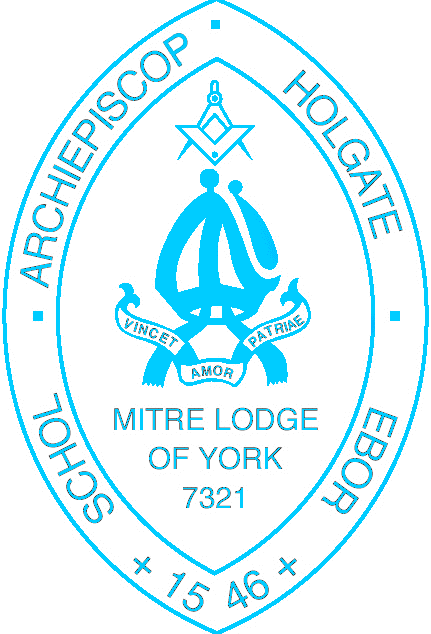
Mitrelodgeofyork.org.uk
Mitre Lodge 7321
Masonic Halls
Each Masonic Hall has its own features, but all are intended to represent the Temple of Solomon in Jerusalem. There will be common features – the black and white square pavement (usually a carpet), representing light and darkness, the Volume of the Sacred Law – usually a bible, although any holy book is acceptable, the chairs for the Master (in the East) and his Wardens (in the West and South) and for other officers. Some lodges meet in village halls or hotels, so their equipment is removable. For example, Forest of Galtres Lodge meets in a room at the Galtres Centre in Easingwold. Some Masonic Halls are purpose built – those at Duncombe Place, York, and Roman Road, Middlesbrough, for example, and others are converted from a previous use – often a school or technical college, such as St Saviourgate, York, and Beverley Road, Hull.
Officers of the Lodge
Worshipful Master
Senior Warden, Junior Warden
Senior Deacon, Junior Deacon
Inner Guard, Tyler (or Outer Guard)
Chaplain, Treasurer, Mentor, Membership Officer
Director of Ceremonies, Assistant DC
Secretary, Assistant Secretary
Almoner, Charity Steward
Organist, Stewards
The Immediate Past Master sits to the left of the Master
Meetings
Every meeting starts with the Worshipful Master and his Wardens and Deacons processing into the Lodge. They then take their places and the Lodge is formally opened using a recognised format.
The minutes of the previous meeting are approved and signed, and we then proceed with the rest of the business. This varies – there may be a ceremony of Initiation, when a candidate becomes an Entered Apprentice Freemason, or a second degree (an entered apprentice being passed to the degree of Fellowcraft) or third degree (a Fellowcraft being raised to the degree of Master Mason). At the October meeting, we have the ceremony of Installation, when the new Master takes the chair.
If we have no ceremony to perform, we may have a lecture, or simply complete the business and have a social evening.
We always take reports from the Almoner, who looks after the welfare of members, their wives, families and widows, and from the Charity Steward, who reports on donations we have made to various charities or suggests new causes to support. The meeting ends with a retiring procession, after which members go to the dining room for a meal, often referred to as the Festive Board. This is an opportunity for socialising; there is some formal business – we always drink a toast to The Queen and one to the Grand Master, and there may be other toasts. The Master will read out any notices and there will often be a raffle with proceeds going to charity.
Religion
Discussion of religion and politics is forbidden in the Lodge. However, in order to become a Mason, a candidate must have a belief in a Supreme Being. Thus, Freemasonry is a multi-faith organisation and members include Christians, Jews, Muslims, Sikhs and Hindus as well as other faiths. The belief that Catholics cannot become Freemasons is untrue – members of all religions are welcome.
Why do people become Freemasons?
Freemasonry can be described as a way of life. Members are encouraged to better themselves; members of all religions are welcome and there is an ethos of helping others, very much as practised in all the major religions. Freemasonry often helps a member to gain self-confidence – those who volunteer to take part in the various ceremonies need to learn parts of the ritual, and the support offered by other members is extremely satisfying. So far as Mitre Lodge is concerned, it doesn’t matter if somebody attempts to get it right but makes a mistake – we are there to support each other, not to criticise.
There is a mistaken belief that Freemasonry can bring benefits. In fact, anybody who wants to gain financially or in business will not be admitted – any attempt to make personal gain is strictly forbidden. The real benefit is joining a group of friendly and supportive individuals.
Secret handshakes?
In mediaeval times, when literacy was rare and often confined to the churches and ruling classes, and certificates of competence unknown, a stonemason would learn a secret handshake and password in keeping with his level of training. This tradition has been adopted by Freemasons, and that is as far as “secrets” go – I wouldn’t tell you the PIN number from my bank card either! So far as the baring of breasts and rolling up of trouser legs is concerned, this is done in each ceremony to show that the candidate is a man and is free – i.e. not shackled like a slave. It doesn’t happen every meeting!
Charity
Charity is an important part of Freemasonry. Freemasons do not collect money from the public, as other organisations do, but donate their own money. In recognition of the fact that Freemasonry includes people in all walks of life, each member gives what he can afford and there is no compulsion to give any specific amount, although part of the annual subscription goes to charity.
Various charities are supported, both Masonic and non-Masonic – for example, Yorkshire Air Ambulance and York Hospital Charity.
Social events
The Mitre Lodge, in common with other lodges, has a regular programme of social events. These include the Summer barbecue, held at the home of one of our members.